Upcoming Events

- Viktoria Batista
- 4:00 pm to 5:00 pm
- Braun Room (12th Floor), Cathedral of Learning
Tuesdays, 4-5pm
Braun Room (12th Floor), Cathedral of Learning
Come to chat, practice, meet others who are interested in Hungarian and Hungary! All levels are welcome.
For more info, contact Dr. Viktoria Batista (vib21@pitt.edu)
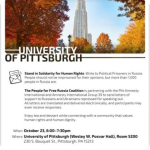
- 6:00 pm to 7:30 pm
- Posvar Hall, Room 5200
Stand in Solidarity for Human Rights: Write to Political Prisoners in Russia. People should not be imprisoned for their opinions, but more than 1,000 people in Russia are.
The People for Free Russia Coalition is partnering with the Pitt Amnesty International and Amnesty International Group 39 to send letters of support to Russians and Ukrainians repressed for speaking out. All letters are translated and delivered electronically, and participants may even receive responses.
Enjoy tea and dessert while connecting with a community that values human rights and human dignity.

- 4:00 pm
- Andrew Carnegie Music Hall - Carnegie, PA
Hear the thoughts of the Ukrainian People from Ukraine and in the Diaspora. Collaboration with local artists. Information and tickets @ https://kyivdance.org/my-thoughts-production Ukrainian Marketplace Opens 2pm
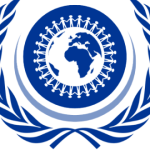
- 8:00 am to 4:00 pm
- William Pitt Union and O'Hara Student Center, Pitt-Oakland Campus Model United Nations high school simulation
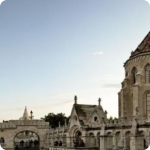
- Viktoria Batista
- 4:00 pm to 5:00 pm
- Braun Room (12th Floor), Cathedral of Learning
Tuesdays, 4-5pm
Braun Room (12th Floor), Cathedral of Learning
Come to chat, practice, meet others who are interested in Hungarian and Hungary! All levels are welcome.
For more info, contact Dr. Viktoria Batista (vib21@pitt.edu)
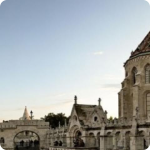
- Viktoria Batista
- 4:00 pm to 5:00 pm
- Braun Room (12th Floor), Cathedral of Learning
Tuesdays, 4-5pm
Braun Room (12th Floor), Cathedral of Learning
Come to chat, practice, meet others who are interested in Hungarian and Hungary! All levels are welcome.
For more info, contact Dr. Viktoria Batista (vib21@pitt.edu)

- Tatyana Gershkovich, Associate Professor, Carnegie Mellon University
- 5:00 pm to 6:30 pm
- 4130 Posvar Hall
Join CMU Associate Professor of Russian Studies Tatyana Gershkovich for the launch of this new book, translated and edited with Stephen H. Backwell, and recently published by Academic Studies Press! Yuli Aikhenvald was one of the most popular and influential Russian literary critics of the early 1900s. His major book, Silhouettes of Russian Writers, went through six ever-expanding editions. A major presence in Vladimir Nabokov’s early career, Aikhenvald has since been neglected by other writers and critics. This collection translates several of Aikhenvald’s key essays, making him available to English-speaking readers for the first time.
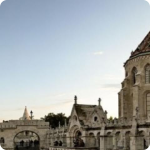
- Viktoria Batista
- 4:00 pm to 5:00 pm
- Braun Room (12th Floor), Cathedral of Learning
Tuesdays, 4-5pm
Braun Room (12th Floor), Cathedral of Learning
Come to chat, practice, meet others who are interested in Hungarian and Hungary! All levels are welcome.
For more info, contact Dr. Viktoria Batista (vib21@pitt.edu)

- Anna Shternshis (University of Toronto)
- 4:00 pm
- Baker Hall 246A, Carnegie Mellon University Soviet history
In 1945, Shikl Gershberg sang a song about the massacre by German and Romanian troops that killed 437 people in his small Ukrainian town in July 1941. It ended with the haunting line: "Our town of Zhabokrych became a cemetery." For many years, the song was the only memorial to Gershberg's family and community. A physical monument remained unrealized due to restrictions by Soviet authorities. This paper, based on newly discovered archival materials, oral histories, and memoirs, examines how Soviet citizens dealt with state prohibitions against public commemorations of Holocaust victims, and engaged in personal and communal acts of remembrance after the war. Part of the Socialist Studies Seminar series.
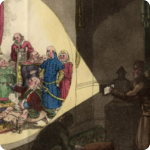
- Brett King (North Carolina) and Anna Kovalova (University of Pittsburgh)
- 6:00 pm
- Frick Fine Arts Auditorium (Room 0125)
Step back in time and witness the spellbinding spectacle that inspired the birth of cinema! Join us for a real magic lantern show, a live performance that brings to life one of the most captivating forms of nineteenth-century visual entertainment. A family-friendly event recommended for kids 12 and up and for younger adventurers who aren't afraid of ghosts! Admission is FREE, but registration is required. Please register via the link (https://docs.google.com/forms/d/1P76a_R8zCvD09N31XmsOy86qYInqSVguzezyBYx...) Sponsored by: Center for Russian, East European, and Eurasian Studies | Department of Slavic Languages and Literatures | Film and Media Studies Program | Nationality Rooms and Intercultural Exchange Programs

- Viktoria Batista
- 4:00 pm to 5:00 pm
- Braun Room (12th Floor), Cathedral of Learning
Tuesdays, 4-5pm
Braun Room (12th Floor), Cathedral of Learning
Come to chat, practice, meet others who are interested in Hungarian and Hungary! All levels are welcome.
For more info, contact Dr. Viktoria Batista (vib21@pitt.edu)
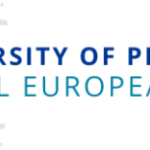
- 8:00 am to 4:00 pm
- William Pitt Union simulation, European Union
The High School Model European Union is an annual event for area high school students. The goal of the Model EU is to give high school students a chance to learn about the workings of the European Union through a hands-on simulation. Playing the roles of presidents and prime ministers, students spend a day engaged in intense negotiations over conflicting issues about the EU. The objective is to simulate a specific European Council meeting that focuses on recent current events impacting the EU. Model EU enhances students’ understanding of classroom learning and gives them a real sense of the challenges involved in the decision-making process of the European Union.
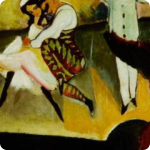
- Daria Khitrova
- 6:30 pm to 8:00 pm
This webinar is the second in a six-part series The Arts of Eastern Europe and Eurasia, designed to support educators in bringing the arts of Russia, Eastern Europe, and Eurasia into their classrooms. During this session, we will learn about the Russian ballet as a powerful cultural force shaped by political, religious, and aesthetic pressures from the 19th to the 20th century. We will examine how ballet was viewed by critics, dancers, and administrators—as both an “impossible” art form and a near-religious practice of survival and expression. Educators will gain tools to connect performing arts with broader historical and cultural themes, enriching classroom discussions around artistic expression under authoritarian regimes, the role of tradition in modernity, and how art can serve both resistance and conformity. https://daviscenter.fas.harvard.edu/events/russian-ballet
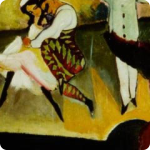
- Daria Khitrova
- 6:30 pm to 8:00 pm
- Zoom
- Eurasian arts
This webinar is the third in a six-part series, The Arts of Eastern Europe and Eurasia, designed to support K-14 educators in bringing the arts of Russia, Eastern Europe, and Eurasia into their classrooms. During this session, we will learn about the Russian ballet as a powerful cultural force shaped by political, religious, and aesthetic pressures from the 19th to the 20th century. We will examine how ballet was viewed by critics, dancers, and administrators—as both an “impossible” art form and a near-religious practice of survival and expression. Educators will gain tools to connect performing arts with broader historical and cultural themes, enriching classroom discussions around artistic expression under authoritarian regimes, the role of tradition in modernity, and how art can serve both resistance and conformity.
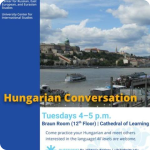
- Viktoria Batista
- 4:00 pm to 5:00 pm
- Braun Room (12th Floor), Cathedral of Learning
Tuesdays, 4-5pm
Braun Room (12th Floor), Cathedral of Learning
Come to chat, practice, meet others who are interested in Hungarian and Hungary! For more info, contact Dr. Viktoria Batista, vib21@pitt.edu
- 1 of 2
- next ›
